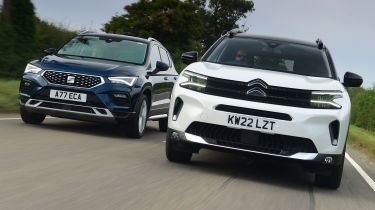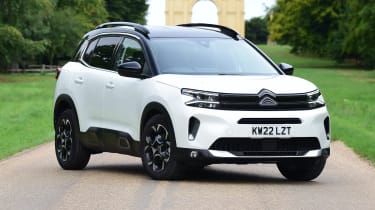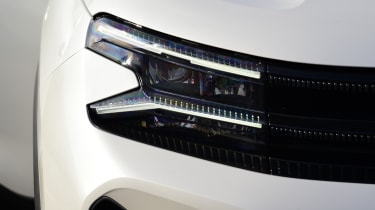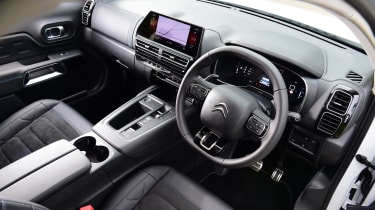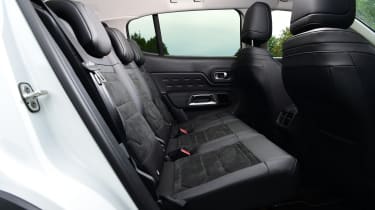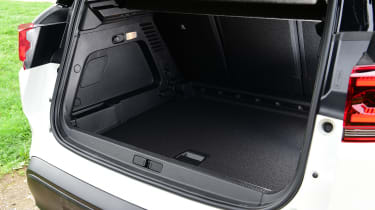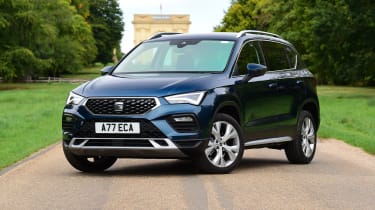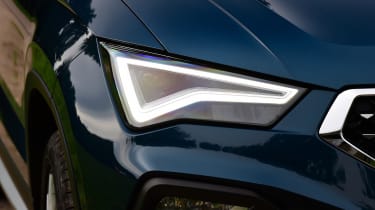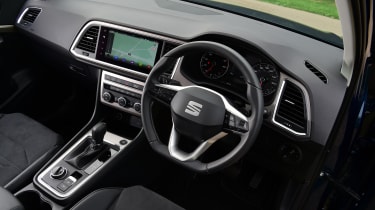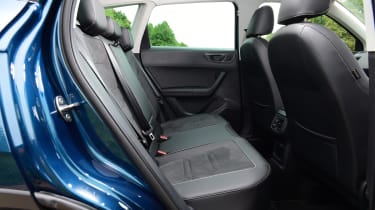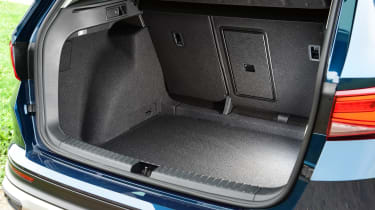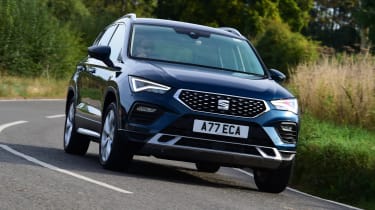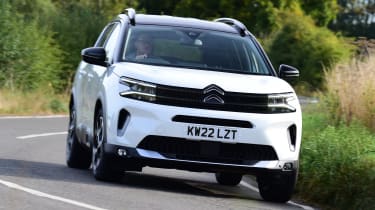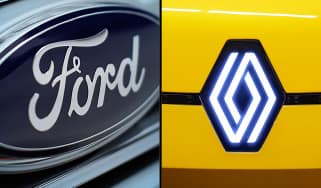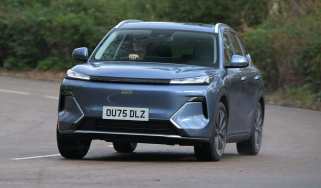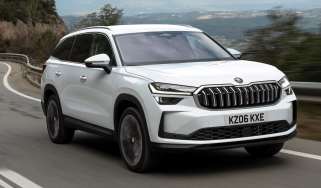Citroen C5 Aircross vs SEAT Ateca: 2022 twin test review
Two cars chasing the same buyers – one quirky, the other sporty. So which should you go for?
Some people say that all SUVs are the same. That high-riding family cars all blend into one, and whether you look at them, inside or out, or even take them out on the road, then you’d be hard pressed to notice any differences at all.
If there’s one car in this class that bucks that trend emphatically, it’s the Citroen C5 Aircross. In recent years, the French brand has regained some of the quirkiness and innovation that has made it stand out from the crowd in past decades, and the C5 Aircross is a shining example. Now into the middle stages of its time on sale, it’s been given a spruce up – but have the changes come at the expense of some individuality?
Hammering home the point that some family SUVs are completely different from one another is the SEAT Ateca. Its sharp looks and sporty pretensions are the complete opposite of what the Citroen stands for, but with very similar prices, there’s a strong chance that both will be on your shopping list. But which is better?
Citroen C5 Aircross
At £30,155, the revised Citroen C5 Aircross in Shine trim with the PureTech petrol engine and an eight-speed automatic gearbox is competitively priced in this class. Our test car adds Pearl White paint (£720) and a black roof (£250) raising the total cost to £31,125.
Used - available now

2023 MINI
Cooper Electric
10,932 milesAutomaticElectric
Cash £12,800
2022 BMW
3 Series
78,000 milesAutomaticPetrol2.0L
Cash £17,000
2014 Toyota
Auris
60,000 milesManualPetrol1.6L
Cash £6,000
2022 Volvo
V90
88,000 milesAutomaticPetrol2.0L
Cash £18,250Design & engineering
Within the family crossover class, the C5 Aircross always held a fairly distinctive spot, and the changes for 2022 aim to keep it fresh against many key rivals, including the Ateca.
The styling tweaks align the C5 Aircross with more recent Citroens such as the C4 and C5 X. The grille is no longer split in the middle, and neither are the headlights, although the LED daytime running signature is now split on two levels. The bumper has been tweaked, too, and now includes a skid plate element to give a tougher look, but some of the distinctiveness of the original front end has been lost. The changes elsewhere are more subtle, and include tweaked tail-lights.
Like the outside, it seems like the cabin has been made to look a little more generic. Gone are the vertical central air vents that flanked the old touchscreen; in their place is a widescreen 10-inch display. Everything feels sturdy enough, and the quality of the plastics, though hard in some places, is a match for the SEAT’s.
The seating position is lofty, which gives the occupants a great view out. The seats themselves feature Citroen’s Advanced Comfort design; this uses varying layers of foam throughout the seat frame to combine softness and support. On a long journey they’re very comfortable, but they could do with offering more side support when cornering.
Under the bonnet, there’s a plug-in hybrid option with 222bhp and an electric-only range of 34 miles, plus petrol and diesel engines. Both make 129bhp, and like-for-like, the petrol costs £1,000 less. Both are available with either a six-speed manual gearbox or an eight-speed automatic.
Driving
Citroen has also maintained the suspension set-up of the pre-facelift model, which we applaud because it gives the C5 Aircross a unique feel. Look no further if you care about ride comfort above all else, because this is one of the most relaxing cars in the segment.
It’s achieved through the use of hydraulic bump stops in place of the rubber items used in most typical suspension set-ups. These allow the spring rates to be lower. This can be felt on the move, where the car tends to float over large bumps, and doesn’t crash into ruts harshly as in some alternatives.
The flipside of this is that under hard acceleration or braking, the C5 Aircross tends to rock back and forth on its axles, which might make some passengers feel a little queasy. It’s a feeling that is often felt in slow-moving traffic, where the clumsy calibration between the brakes, gearbox and stop-start system means that it’s incredibly difficult to drive the C5 Aircross smoothly at all. The gearbox is a little frustrating on the move, too, because it’s a little slow to respond at times. We’d recommend saving some cash and getting the manual model because the engine it’s linked to is sweet enough.
The three-cylinder unit transmits a bit more vibration into the cabin than the SEAT’s four-cylinder, but the power delivery is linear. It’s a little slower, however; the 0-62mph time of 10.3 seconds is 1.3 seconds off the pace of the Ateca.
Practicality
A second area where the Citroen just lags behind is passenger space. The back seats are still more than roomy enough, but the Ateca edges the C5 Aircross for both knee and headroom.
However, the Citroen regains ground in other areas. Unlike the Ateca’s middle seat, which is just a raised hump, the Citroen gets an individual chair. It’s slightly narrower than the outer ones, but it’s still more comfortable than its rival’s.
The backrests can recline for a more comfortable seating position, while each unit can slide back and forth, too, allowing you to sacrifice some legroom for boot space when carrying bulky items.
With the back seats in their rearmost position, there are 510 litres of space on offer. Sacrifice the legroom, and that space expands to a vast 720 litres. A split-level boot floor is standard across the range, while there’s the choice between an optional spare wheel or a huge amount of under-floor storage. There’s also a 12-volt socket and four tethering points in the back. Occupants up front get two deep cupholders, but no USB-C sockets.
Ownership
Both Citroen and SEAT achieved little better than an average ranking in our 2022 Driver Power owner satisfaction survey, taking 13th and 17th respectively out of 29 manufacturers. However, the Ateca came an impressive 10th overall in the individual car rankings.
Each car comes with a three-year warranty and 60,000 miles of cover. However, the SEAT’s three-year standard breakdown cover beats the 12 months’ cover that comes with the Citroen.
Running costs
There was little to separate this pair in terms of fuel consumption, but the C5 Aircross just holds the edge. At 40.2mpg, it will cost £3,696 to cover 20,000 miles at current petrol prices. At 39mpg, the Ateca will cost £113 more over the same distance.
Petrol engines aren’t the most favoured by company car owners, and these cars fall into two of the highest Benefit-in-Kind bands. While the plug-in hybrid version of the C5 Aircross offers significantly lower tax deductions, the Ateca isn’t available with a plug-in option.
Tester’s notes: “Make sure you keep your chin clear when opening that boot door, because the struts swing the tailgate open very quickly.”
|
Model: |
Citroen C5 Aircross PureTech Auto Shine |
|
Price: |
£31,155 |
|
Engine: |
1.2-litre 3cyl turbo, 129bhp |
|
0-62mph: |
10.3 seconds |
|
Test Economy: |
40.2mpg/8.8mpl |
|
CO2: |
148g/km |
|
Annual road tax: |
£165 |
SEAT Ateca
We’re pitching the C5 Aircross against the SEAT Ateca in high-ranking Xperience trim. With the 1.5-litre turbocharged petrol engine and seven-speed DSG gearbox, it’s priced at £32,210. There are no extras to add; even metallic paint is a no-cost option.
Design & engineering
Much like the C5 Aircross, the Ateca has also recently been treated to a mid-life facelift. The design changes were very subtle, with minor tweaks to the lights and grille; in fact the most obvious way to tell old from new apart is at the back, where the Ateca lettering has been replaced with a cursive-style font.
While the exterior still looks fairly fresh six years after its release, the dashboard is starting to show its age. A revised infotainment system has kept things up to date from a tech point of view, but the plastic panels and silver trim show the age of the design.
However, everything feels finished nicely enough, even if the hard plastics are slightly more conspicuous here than in the Citroen. The seats are great, though; they’re firmer than those in the C5 Aircross and have more side support. The Alcantara-like fabric is grippy and feels warm, too.
Under the skin, the Ateca is one of a huge variety of VW Group cars that use the MQB platform. That means there’s a choice of six-speed manual and seven-speed dual-clutch automatic gearboxes, and if you go for the most potent petrol or diesel models (each a 2.0-litre unit) there’s four-wheel drive available, too.
The range kicks off with a three-cylinder turbocharged petrol with 108bhp and 200Nm, but here we’re testing the 1.5-litre turbocharged petrol; at 148bhp and 250Nm, it has more power and torque than the Citroen’s 1.2.
Driving
If the C5 Aircross is among the most comforting cars to drive in this segment, then the Ateca is towards the sharper end. The ride is appreciably firmer here, so where the Citroen hits a bump and reacts with a long, lazy bounce, the Ateca tends to hit an undulation more aggressively, but also shakes it off quicker. It’s not a harsh sensation, and many will appreciate the tauter body control.
Through the corners, the Ateca rolls much less than its rival, and has slightly more grip when you do drive it harder, which is something that the C5 Aircross doesn’t really feel willing to do.
The SEAT still isn’t a particularly fun car to drive, but it’s better than most rivals. The steering is light, albeit not as light as the C5 Aircross’s, and it’s precise. This makes the Ateca both easy to drive around town and reassuring along a twisty country road.
The engine and gearbox combination is more convincing than its rival’s here. Even overlooking the fact that it’s much more powerful, there’s also an extra 20Nm of peak torque available from 250rpm lower than in the Citroen. As a result, the SEAT feels more gutsy whether you’re driving it hard or just wafting around. Under hard acceleration, the 1.5-litre unit is a little noisier than the Citroen’s, but it settles down at a cruise. There’s little to separate the pair when it comes to road and wind noise.
The gearbox isn’t perfect; its main flaw is that the clutch engages abruptly at low speeds, which makes it a bit clumsy when reverse parking. On the move, it’s more responsive than the Citroen’s.
Practicality
While the Ateca is marginally more spacious in the back seats, the Citroen has it beaten in the boot. Still, at 510 litres, the Ateca still has plenty of space and isn’t far behind its rival’s capacity, especially when you consider that, at 4,381mm long, the SEAT is 119mm shorter than its rival. It’s lower and narrower, too, which is worth considering if you often need to park in tight spots.
Fold down the rear seats, and the gap between the two narrows. At 1,604 litres, the Ateca falls only 26 litres short of its rival. However, the C5’s false boot floor means that it’s possible to create a flat load area between boot and seat backs, which isn’t possible in the SEAT.
Up front, the Ateca’s cabin features roomy front door pockets, although the central bin is smaller than in the C5 Aircross. Rear passengers can charge their devices through a pair of USB-C sockets, but the rear door bins are quite small.
Ownership
Both of these cars have been tested by Euro NCAP. The Ateca was assessed back in 2016, when it achieved a five-star rating, including a 93 per cent score in the adult occupant protection category.
The C5 Aircross was tested more recently, and to more stringent standards, in 2019, but it scored only four stars, which is disappointing when the majority of its rivals score five.
As standard, the SEAT comes with seven airbags – it has a driver’s knee airbag while the Citroen, with six airbags, does not. However, the Citroen has a blind-spot warning system, which is a feature that’s only offered on the top-spec Ateca Xperience Lux.
Running costs
With residual values of 54.4 per cent for the SEAT and 52.6 per cent for the Citroen, each of these cars loses a little more than £14,000 of its original cost during the first three years or 36,000 miles of ownership.
Those figures mean that both cars have better residuals than rivals such as the Nissan Qashqai and Vauxhall Grandland, but they depreciate a little more than the equivalent Skoda Karoq. The Karoq 1.5 TSI model retains between 56 and 59 per cent of its original retail price over the same period, depending on trim level.
Tester’s notes: “The Ateca’s smartphone shelf is angled forward, so that your phone stays securely in place while you’re driving. It’s a very simple but smart design touch.”
|
Model: |
SEAT Ateca 1.5 TSI DSG Xperience |
|
Price: |
£32,210 |
|
Engine: |
1.5-litre 4cyl turbo, 148bhp |
|
0-62mph: |
9.0 seconds |
|
Test Economy: |
39.0mpg/8.6mpl |
|
CO2: |
151g/km |
|
Annual road tax: |
£165 |
Results
First place: SEAT Ateca
The Ateca is such a solid option in this segment, and is a car that manages to get almost everything right without completely dropping the ball in any one area. It offers similar space within a smaller footprint than the Citroen, while it’s more powerful and sharper to drive. Yet, this doesn’t come to the detriment of refinement. Six years on from launch, it’s still a great family car.
Second place: Citroen C5 Aircross
Even though it takes second here, what’s clear is that the C5 Aircross offers buyers a lot of car for the money, and one that offers a unique prospect both in terms of style and the way it behaves on the road. It’s an incredibly close contest between these two SUVs, but the Citroen is ever so slightly let down by its clunky in-car tech and a disappointing powertrain.
Four alternative family SUVs to try
Hyundai Tucson
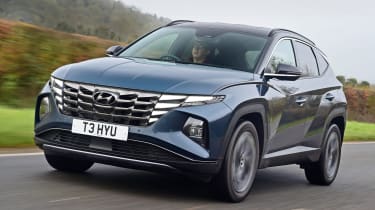
- Model: Tucson 1.6 T-GDi 48V DCT Premium
- Price: £32,950
- Engine: 1.6-litre 4cyl, 148bhp
Hyundai is on a roll, and the Tucson is one of the most convincing cars it makes. It’s off to a great start with the striking styling; the dramatic LED lights up front are complimented by the equally distinctive full-width light bar at the back.
Inside, the enormous 620-litre boot is one of the largest in the class, and the Tucson is just as accommodating for passengers. There’s a brilliant, German-like feeling of solidity to all the major controls; the finish is a step above that in both the C5 Aircross and the Ateca. That sturdiness continues on the road, where it’s a great long-distance cruiser.
One of the few areas where there’s room for improvement is the engine, because while the 1.6-litre turbo’s 148bhp is on a par with its rivals, it’s not the most refined. This is only a minor flaw, though, and with so many reasons to commend it, it’s no surprise that the Tucson is our Mid-Size SUV of the Year.
Nissan Qashqai
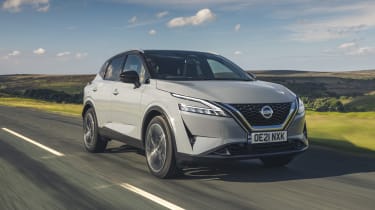
- Model: Qashqai 1.3 DiG-T 158 N-Connecta
- Price: £33,135
- Engine: 1.3-litre 4cyl, 156bhp
The Nissan Qashqai is the car that, in effect, created the class that blended traditional family hatchbacks with SUVs.
However, this third-generation model has stiff competition, although it holds its own in many areas. Plenty of thought has gone into making the car work well for family life; take the back doors, which open to 85 degrees to make access as easy as possible. There’s decent space, plus a 504-litre boot.
From behind the wheel, it’s a fairly calming place to be. It feels planted and sturdy on the road. The 1.3-litre turbocharged engine can sound a little thrashy, but if you’re able to stretch the budget a little further, the e-Power hybrid is an intriguing prospect. This combines a powerful electric motor with a petrol engine that charges the battery rather than driving the wheels directly, resulting in a car that responds like an EV on the road and is claimed to deliver 53.3mpg.
Skoda Karoq
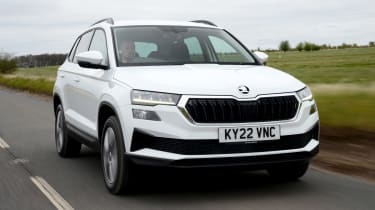
- Model: Karoq 1.5 TSI DSG SE L
- Price: £31,240
- Engine: 1.5-litre 4cyl, 148bhp
If the SEAT is the car viewed as the sporty option and the Citroen is the more relaxed choice, the Karoq manages to hit a sweet spot right in the middle.
Mechanically, the Karoq is near-identical to the Ateca, but the Skoda is our choice thanks to its slightly more forgiving ride quality. Practicality is also a strong point. The exterior footprint and interior space are much the same as the SEAT, although Skoda adds its own clever touches to make it even more versatile for family life.
The dashboard layout is unique to the Skoda, and the overall level of finish is largely on a par with its Spanish counterpart.
Our pick of the current line-up is the SE L, which gets 18-inch alloy wheels, heated steering wheel and front seats, and a reversing camera. There’s another reason why the Skoda gets the nod, and that’s because it’s cheaper than the SEAT on monthly finance deals at the moment.
Vauxhall Grandland
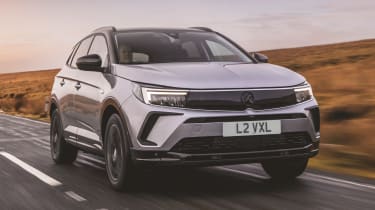
- Model: Grandland 1.2 Turbo GS Line
- Price: £29,855
- Engine: 1.2-litre 3cyl, 129bhp
Vauxhall recently treated the Grandland to a mid-life facelift, and it added appeal to what was already one of the stronger options in the segment.
The changes are obvious at the front, where the Grandland gets the distinctive ‘Vizor’ design seen on other Vauxhalls of late. The dashboard looks clean and modern, although the piano black trim may not stand up to family life too well.
With Vauxhall now forming part of the same Stellantis empire as Citroen, the Grandland and the C5 Aircross share many components, including the 1.2-litre turbocharged petrol engine. However, the Grandland is a little smaller inside, and also a little more sportier to drive; it’s almost as much fun as the SEAT.
It’s competitively priced, too; on a three-year PCP with a £3,000 deposit and 10,000-mile annual limit, the middling GS Line model comes to £486 per month – right on a par with the C5 Aircross.
Figures
|
SEAT Ateca 1.5 TSI DSG Xperience |
Citroen C5 Aircross PureTech auto Shine | |
|
On the road price/total as tested |
£32,210/£32,210 |
£30,155/£31,125 |
|
Residual value (after 3yrs/36k miles) |
£17,525/54.4% |
£15,849/52.6% |
|
Depreciation |
£14,685 |
£14,306 |
|
Annual tax liability std/higher rate |
£2,210/£4,420 |
£2,031/£4,062 |
|
Annual fuel cost (12k/20k miles) |
£2,286/£3,809 |
£2,217/£3,696 |
|
Insurance group/quote/VED |
18/£831/£165 |
18/£763/£165 |
|
Cost of 1st/2nd/3rd service |
£540 (2 years) |
£637 (3 years) |
|
Length/wheelbase |
4,381/2,638mm |
4,500/2,730mm |
|
Height/width |
1,615/1,841mm |
1,689/1,969mm |
|
Engine |
4cyl in-line/1,498cc |
3cyl in-line/1,199cc |
|
Peak power/revs |
148/5,000 bhp/rpm |
129/5,500 bhp/rpm |
|
Peak torque/revs |
250/1,500 Nm/rpm |
230/1,750Nm/rpm |
|
Transmission |
7-spd auto/fwd |
8-spd auto/fwd |
|
Fuel tank capacity/spare wheel |
50 litres/repair kit |
53 litres/dealer-fit |
|
Boot capacity (seats up/down) |
510/1,604 litres |
580/1,630 litres |
|
Kerbweight/payload/towing weight |
1,343/597/1,800kg |
1,559/412/1,300kg |
|
Turning circle |
10.8 metres |
10.2 metres |
|
Basic warranty (miles)/recovery |
3yrs (60k)/3yrs |
3yrs (60k)/1yr |
|
Driver Power manufacturer |
17th |
13th |
|
NCAP: Adult/child/ped./assist/stars |
93/84/71/60/5 (’16) |
87/86/58/75/4 (’19) |
|
0-62mph/top speed |
9.0 secs/126mph |
10.3 secs/117mph |
|
Test mpg/range |
39.0/429 miles |
40.2/469 miles |
|
WLTP combined |
42.2mpg |
43.5mpg |
|
WLTP combined |
9.3 mpl |
9.6 mpl |
|
Claimed CO2/tax bracket |
151g/km/35% |
148g/km/34% |
|
Airbags/Isofix/park sensors/camera |
Seven/yes/f&r/yes |
Six/yes/f&r/yes |
|
Auto box/lane keep/blindspot/AEB |
Yes/yes/no/yes |
Yes/yes/yes/yes |
|
Climate control/adaptive cruise |
Yes/yes |
Yes/yes |
|
Leather/heated seats |
No/no |
No/yes |
|
Metallic paint/LED lights |
£0/yes |
£595/yes |
|
Keyless entry & go/powered tailgate |
Yes/no |
Yes/£790 |
|
Sat-nav/digital dashboard |
Yes/no |
Yes/yes |
|
DAB radio/connected services |
Yes/yes |
Yes/yes |
|
Wireless charge/CarPlay/Android Auto |
Yes/yes/yes |
Yes/yes/yes |
